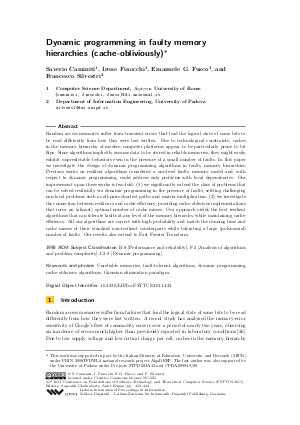Dynamic programming in faulty memory hierarchies (cache-obliviously)
Authors Saverio Caminiti, Irene Finocchi, Emanuele G. Fusco, Francesco Silvestri
-
Part of:
Volume:
IARCS Annual Conference on Foundations of Software Technology and Theoretical Computer Science (FSTTCS 2011)
Part of: Series: Leibniz International Proceedings in Informatics (LIPIcs)
Part of: Conference: IARCS Annual Conference on Foundations of Software Technology and Theoretical Computer Science (FSTTCS) - License:
 Creative Commons Attribution-NonCommercial-NoDerivs 3.0 Unported license
Creative Commons Attribution-NonCommercial-NoDerivs 3.0 Unported license
- Publication Date: 2011-12-01
File

PDF
LIPIcs.FSTTCS.2011.433.pdf
- Filesize: 0.49 MB
- 12 pages
Document Identifiers
Subject Classification
Keywords
- Unreliable memories
- fault-tolerant algorithms
- dynamic programming
- cache-oblivious algorithms
- Gaussian elimination paradigm
Metrics
- Access Statistics
-
Total Accesses (updated on a weekly basis)
0Document
0Metadata
Abstract
Random access memories suffer from transient errors that lead the logical state of some bits to be read differently from how they were last written. Due to technological constraints, caches in the memory hierarchy of modern computer platforms appear to be particularly prone to bit flips. Since algorithms implicitly assume data to be stored in reliable memories, they might easily exhibit unpredictable behaviors even in the presence of a small number of faults. In this paper we investigate the design of dynamic programming algorithms in faulty memory hierarchies. Previous works on resilient algorithms considered a one-level faulty memory model and, with respect to dynamic programming, could address only problems with local dependencies. Our improvement upon these works is two-fold: (1) we significantly extend the class of problems that can be solved resiliently via dynamic programming in the presence of faults, settling challenging non-local problems such as all-pairs shortest paths and matrix multiplication; (2) we investigate the connection between resiliency and cache-efficiency, providing cache-oblivious implementations that incur an (almost) optimal number of cache misses. Our approach yields the first resilient algorithms that can tolerate faults at any level of the memory hierarchy, while maintaining cache-efficiency. All our algorithms are correct with high probability and match the running time and cache misses of their standard non-resilient counterparts while tolerating a large (polynomial) number of faults. Our results also extend to Fast Fourier Transform.
Cite As Get BibTex
Saverio Caminiti, Irene Finocchi, Emanuele G. Fusco, and Francesco Silvestri. Dynamic programming in faulty memory hierarchies (cache-obliviously). In IARCS Annual Conference on Foundations of Software Technology and Theoretical Computer Science (FSTTCS 2011). Leibniz International Proceedings in Informatics (LIPIcs), Volume 13, pp. 433-444, Schloss Dagstuhl – Leibniz-Zentrum für Informatik (2011)
https://doi.org/10.4230/LIPIcs.FSTTCS.2011.433
BibTex
@InProceedings{caminiti_et_al:LIPIcs.FSTTCS.2011.433,
author = {Caminiti, Saverio and Finocchi, Irene and Fusco, Emanuele G. and Silvestri, Francesco},
title = {{Dynamic programming in faulty memory hierarchies (cache-obliviously)}},
booktitle = {IARCS Annual Conference on Foundations of Software Technology and Theoretical Computer Science (FSTTCS 2011)},
pages = {433--444},
series = {Leibniz International Proceedings in Informatics (LIPIcs)},
ISBN = {978-3-939897-34-7},
ISSN = {1868-8969},
year = {2011},
volume = {13},
editor = {Chakraborty, Supratik and Kumar, Amit},
publisher = {Schloss Dagstuhl -- Leibniz-Zentrum f{\"u}r Informatik},
address = {Dagstuhl, Germany},
URL = {https://drops.dagstuhl.de/entities/document/10.4230/LIPIcs.FSTTCS.2011.433},
URN = {urn:nbn:de:0030-drops-33241},
doi = {10.4230/LIPIcs.FSTTCS.2011.433},
annote = {Keywords: Unreliable memories, fault-tolerant algorithms, dynamic programming, cache-oblivious algorithms, Gaussian elimination paradigm}
}
